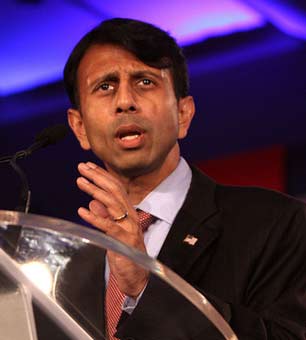The corporate profit share of national income is near a post-World War II high. The share of income going to the richest 1 percent is almost at its pre-Depression peak.
These would seem like impressive accomplishments, but the process of upward redistribution, from Joe Sixpack to Joe Six Houses, is a never-ending struggle. Toward this end, Louisiana Governor and Republican wunderkind Bobby Jindal, has just proposed replacing the state’s income tax with a sales tax.
Sales taxes will generally be more regressive than income taxes for the simple reason that low- and moderate-income people will spend a larger share of their income than upper income people. That means that the portion of income that wealthy Louisianans save will escape taxation, imposing a larger burden on low- and middle-income families in any revenue-neutral shift.
However, saving is only part of the story in this picture. Wealthy Louisianans are likely to spend more time and money outside of the state than less affluent residents. Insofar as wealthy Louisianans spend money at out-of-state vacation homes or Parisian shopping trips, they will be creating a tax gap for the less affluent and less well traveled to fill.
In fact, fans of economics will likely point to the problem of Louisianans stepping over the border (less than an hour away from the state’s major cities) to escape the sales tax on purchases of big-ticket items like televisions and refrigerators. This will leave an even larger burden for the sales tax to cover, which will fall especially hard on those who may not have access to a car or who for other reasons might not find it as easy to take advantage of such tax-evading tourism.
So, this shift from an income tax to a sales tax looks like a big step forward in the process of upward redistribution. It’s easy to see why Jindal is considered a leading contender for the 2016 Republican nomination.
Needless to say, the wealthy dislike state income taxes every bit as much as they dislike federal ones. Insofar as they gain complete control of state governments, they will take the opportunity to shift the tax burden lower down the income ladder.
They may get help in this process from one of the widely talked about tax reforms at the federal level: limiting the total amount of tax deductions that can be taken. While this may sound like a progressive measure – requiring that everyone pay their fair share of taxes – this limit could put pressure on state governments to reduce taxes on the wealthy.
With the restoration of the Clinton-era tax rates, the highest-income taxpayers are facing a marginal tax rate of almost 40 percent. This means that almost 40 percent of the state income tax paid by the wealthiest taxpayers is, in effect, paid by the federal government, since it comes directly off their taxes.
However, if there was a cap on deductions which most of the wealthiest taxpayers actually hit, then the burden of state income taxes would fall fully on the wealthy people in the state. Needless to say, the wealthy in New York, California and other relatively high tax states will raise much more objection to state income taxes when they are paying 100 cents on every dollar rather than 60 cents on every dollar of the tax. A likely outcome will be lower state taxes on the wealthy and higher taxes and/or reduced services for everyone else.
The picture looks even less appealing when we consider that contributions to charity are likely to be excluded from the cap. This means that if a wealthy person feels bad about homelessness so that she contributes $100,000 to a charity to shelter the homeless, the federal government will pick up $40,000 of this tab. However, if she and others in the state consider sheltering the homeless to be an obligation of government that should not depend on the kindness of the wealthy, the taxes to cover the cost will be fully borne out of their own pocket.
It’s hard to see the rationale for this asymmetry, but wait: it gets worse. Suppose our rich person gives $100,000 to an opera that he and his rich friends patronize. The federal government will pick up $40,000 of that contribution, but zero for the state government’s efforts to shelter the homeless. Suppose that our rich person decides that his friend should get a $1 million annual salary to run the opera. Well, the feds are on the hook for 40 percent of his friend’s salary, but still not contributing to the state’s efforts to shelter the homeless.
The point here should be clear. The effort to cap deductions is not actually about making the rich pay higher taxes; it is about putting pressure on state governments to cut back their services. President Obama proposed limiting deductions to a 28 percent rate regardless of individuals’ tax rate. This policy makes sense as a way of getting more tax revenue from those who can most afford to pay it. Capping the deduction does not. There is a reason that Republicans support it.
Trump is silencing political dissent. We appeal for your support.
Progressive nonprofits are the latest target caught in Trump’s crosshairs. With the aim of eliminating political opposition, Trump and his sycophants are working to curb government funding, constrain private foundations, and even cut tax-exempt status from organizations he dislikes.
We’re concerned, because Truthout is not immune to such bad-faith attacks.
We can only resist Trump’s attacks by cultivating a strong base of support. The right-wing mediasphere is funded comfortably by billionaire owners and venture capitalist philanthropists. At Truthout, we have you.
Truthout has launched a fundraiser to raise $45,000 in the next 8 days. Please take a meaningful action in the fight against authoritarianism: make a one-time or monthly donation to Truthout. If you have the means, please dig deep.
